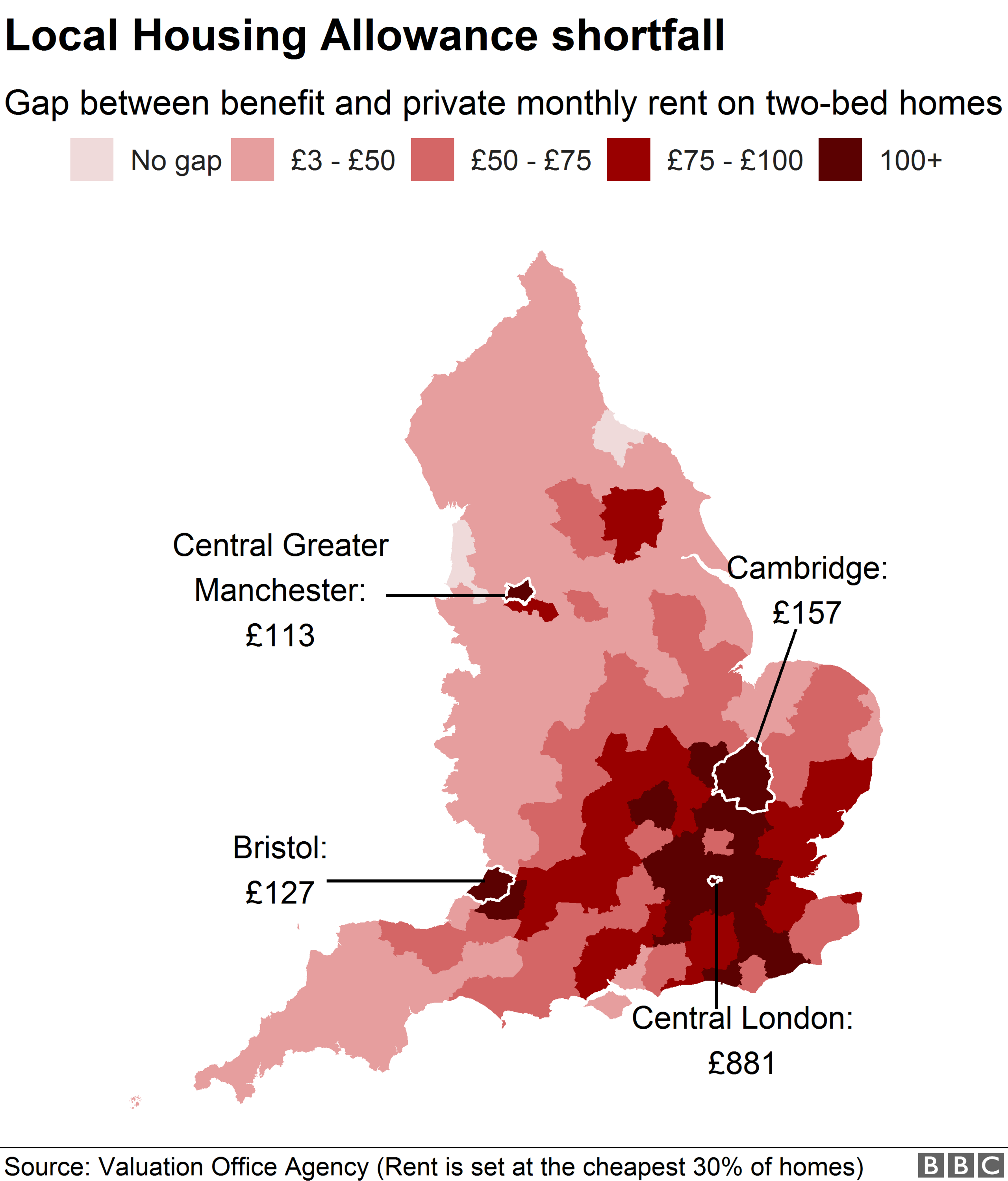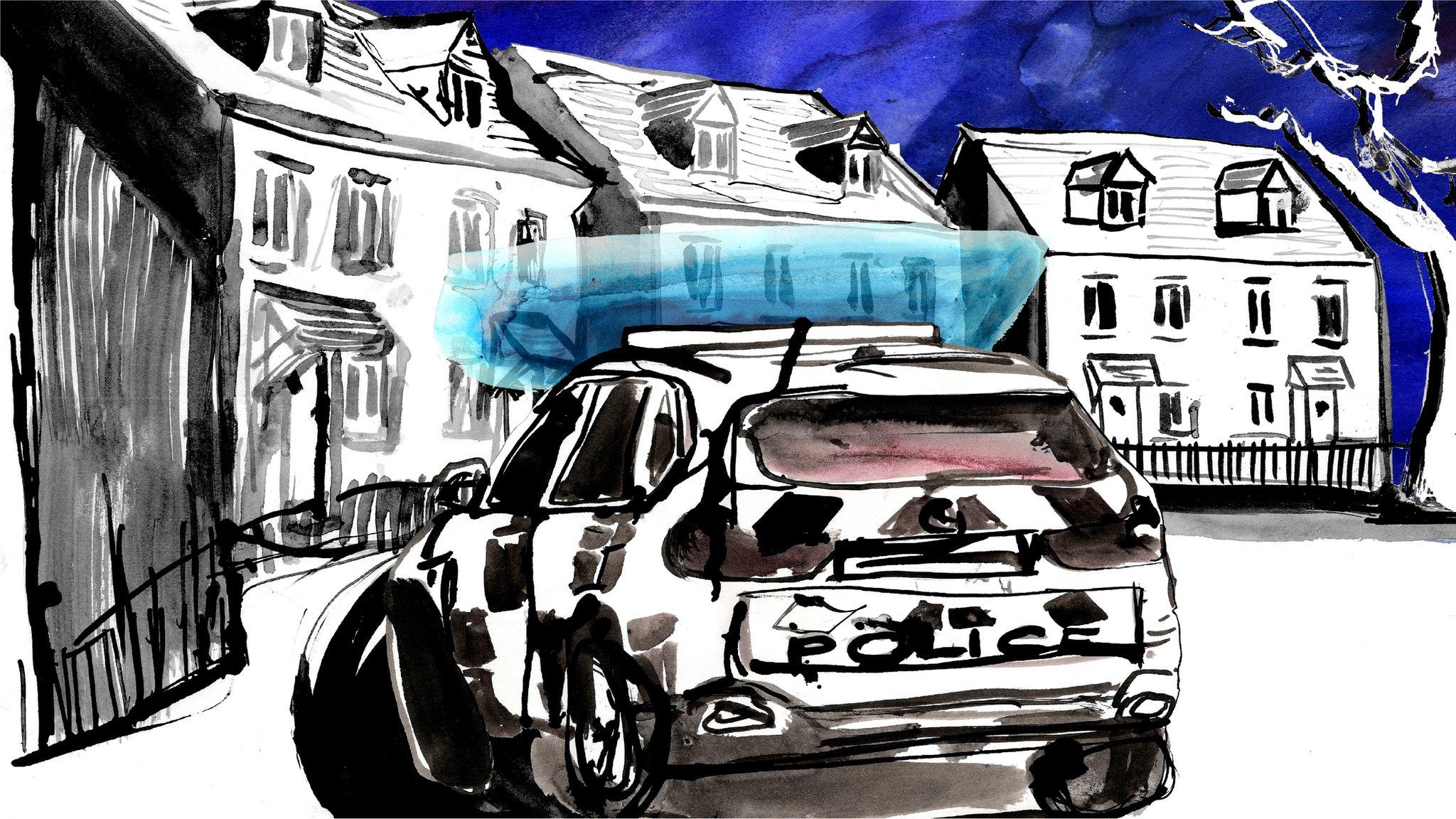Benefit cuts 'have made private renting unaffordable'
- Published

Krystyna and Geoff Boswell had to move hundreds of miles for a home they could rent
Renting privately across most of England has become unaffordable for people on benefits, housing charities have warned, with people in some areas short of at least £100 a month.
Analysis by the BBC has shown the gap between rent and Local Housing Allowance (LHA) more than doubled across most of the country since 2016.
Shelter said people were having to "choose between food and rent".
The government said it had targeted extra funding at low-income households.
Working age benefits were frozen for four years in 2016, while rents have continued to rise.
LHA, housing benefit for people in private rented accommodation, is calculated based on rents in 152 "broad rental market areas", external.
It means about three in 10 properties for rent in each area should be affordable to someone on housing benefit.
However in 85 areas the gap between the cheapest third of rents and LHA was more than £50 a month for a two-bedroom home and in 32 it was more than £100.
Since 2016 the gap has at least doubled in 75 areas, while a further 29 now have a gap when they did not before.
Separate research published by the charity Crisis and the Chartered Institute of Housing suggested 97% of areas in England, 82% in Wales, and 67% in Scotland were "unaffordable to single people, couples and small families".
'We moved hundreds of miles to a house we'd never even seen'

Krystyna Boswell and husband Geoff are using disability benefits to cover the rent
Krystyna and Geoff Boswell receive about £93 a week to help with the cost of renting in north Cornwall. However, their rent is £160 a week and the rest of the money has to come from their disability benefits.
Mrs Boswell, aged 59, has Aspergers and dyspraxia and her husband, 61, has Ehlers-Danlos syndrome.
They sold their home in Wolverhampton in 2012 after Mr Boswell was made redundant and rented for four years before their landlord decided to sell the flat.
Mrs Boswell said none of the letting agents they approached would consider the couple and they could not get a council house.
"We would have ended up homeless and on the street if it hadn't been for someone at the local church who had a connection in north Cornwall who knew of a house becoming ready to let in her village," she said.
The couple packed up and drove more than 200 miles.
"We didn't even see the house before we moved in," Mrs Boswell said.
"We receive the LHA for a one-bed property, which is ludicrously out of line with the true cost of private rents," she said.



What is Local Housing Allowance?
LHA was introduced in 2008 and is used to calculate housing benefit for people in private rented accommodation.
About 860,000 households in England receive this benefit with a further 300,000 on the housing element of Universal Credit.
The rates they get vary from area to area and are compared with 30% of the local rental market.
There are different rates for shared accommodation, one-bed, two-bed, three-bed, four-bed and five-bed homes and people's entitlement is based on how many rooms they are deemed to need.


'Choosing between food and rent'
Shelter said any gap between LHA and the bottom third of rents made housing "unaffordable" for people on benefits.
Polly Neate, chief executive, said: "Even the cheapest rents are now beyond reach to claimants."
"We hear from people having to scrape together over £100 a month, sometimes from their disability benefits, to make up the shortfall," she said.
"For some, this means choosing between food and rent, between their children's shoes and rent. If LHA rates remain stuck where they are then people will keep being plunged into the misery of homelessness as a direct result."
She called for the government to lift the freeze on LHA rates "so they can at least cover the bottom third of the local rental market."
Jon Sparkes, chief executive of Crisis, added: "More and more people are forced to make impossible choices between keeping up with the rent and paying for essentials like food and bills, all the while knowing that falling behind with payments could cost them their homes."
He said benefits needed to be brought "back in step with the true cost of renting" to prevent people becoming homeless.
John Stewart, policy manager for the Residential Landlords Association, said: "If the government wants the private rented sector to pick up social housing supply then there is a cost to that and Local Housing Allowance does not meet that cost.
"If a landlord can rent a property at the full market rate they will be more likely to choose the tenant who is not on benefits.
"The government needs to look at the freeze again. Restoring the housing element of benefits to 30% of market rents would be a clear step in the right direction."
A government spokeswoman said: "Since 2010 we have delivered more than 400,000 affordable properties, we spend around £23bn a year on Housing Benefit and have provided local authorities with £1bn to support vulnerable claimants.
"We have increased more than 360 LHA rates this year, by targeting extra funding at low-income households, and the government has no intention of extending the current benefit freeze."
- Published3 April 2019

- Published9 July 2020

- Published6 May 2019
